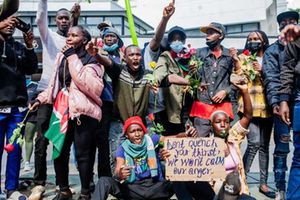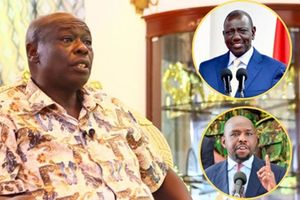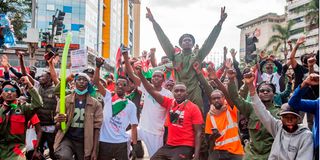
Protesters picket along Kenyatta Avenue in Nairobi on June 25, 2025 during the commemoration of the 2024 Gen-Z protests.
Traditional political kingpins are staring at diminished influence as Kenya’s youth threaten to disrupt their stranglehold on ethnic voting blocs.
None of the political heavyweights can claim credit for the well-attended protests held on Wednesday, in which Gen Z used digital tools and social media platforms to mobilise in at least 27 counties to commemorate the historic invasion of Parliament on June 25, 2024.
Born between the late 1990s and 2010, this group of young Kenyans is emerging not just as a voting bloc, but as a cultural and political movement. They have refused to identify with any of the major political players, who have historically rallied the country along ethnic lines.
Most political alliances have in the past been built by bringing together prominent leaders from various communities with promises of sharing government positions.
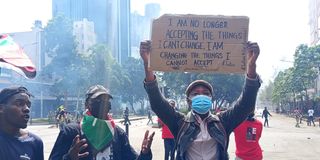
Protesters picket along Kenyatta Avenue in Nairobi on June 25.
This voting pattern, however, is now under threat ahead of the 2027 General Election, as Gen Z begins to play a more active political role.
“Gen Z are likely to erode the influence of the so-called regional kingpins. They will no longer enjoy the sway they’ve held in past elections,” said Prof Macharia Munene, a university lecturer and political analyst.
“They do not recognise those people. They are likely to inspire more citizens to ignore these traditional power brokers and this will have a significant impact in 2027,” he added, while acknowledging that some leaders may still have residual influence.
According to the 2019 Kenya National Bureau of Statistics (KNBS) census, over 75 per cent of Kenya’s 47.6 million people are under the age of 35.
Previously, young people, whose lives have largely been shaped by the internet— remained apolitical, allowing seasoned politicians to dominate national affairs.
Their voter turnout in 2022 was low as shown in the post-election report by the Independent Electoral and Boundaries Commission (IEBC). But this appears to have changed dramatically following the June 2024 uprising.
In the 2022 register, 8,811,691 voters were aged between 18 and 34, representing 40 per cent of the total electorate. This number is expected to surge ahead of the 2027 polls.

Youth hold peaceful protests along Kenyatta Avenue in Nakuru town. There is usually a very high social cost to ignoring youth revolution.
In 2022, many Gen Z members were underage while a significant portion of the rest either failed to register or did not vote.
By 2027, most Gen Z will have reached voting age. Analysis of KNBS data shows that over 14 million—four in five—will be eligible to vote, marking a 79.4 per cent increase from 2022.
Kenyans aged 18 to 34 will total approximately 17.8 million, giving them a decisive role in shaping the country’s political future.
Kitui Senator Enoch Wambua described Gen Z’s numerical strength as a powerful force that could transform governance.
Irresponsible leadership
“This is a community of interest bound together by the hardships they have endured under irresponsible leadership. They have drawn a line in the sand and are demanding greater accountability. Thanks to this awakening, the use of tribe as the primary political mobilisation tool has taken a major blow,” said Mr Wambua.
The senator, who is allied to Wiper party leader Kalonzo Musyoka, criticised President William Ruto for failing to provide sustainable solutions for young people.
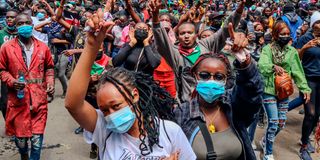
Yong Kenyans protest on Kenyatta Avenue in Nairobi on June 25, 2024.
“As a former member of the infamous YK92, he played a key role in mobilising youth to return Kanu to power during difficult times. Thirty years later, today’s youth are rejecting him and his government—even in his hometown of Eldoret. I cannot understand how he plans to counter this revolt,” Mr Wambua said.
However, Central Organisation of Trade Unions (Cotu) Secretary-General Francis Atwoli on Thursday claimed the protests had been infiltrated by political actors pursuing selfish agendas.
“The demonstrations are no longer controlled by Gen Z. They have been hijacked by politicians,” he said.
In 2013, former President Uhuru Kenyatta and Dr Ruto rose to power through a coalition of Mt Kenya and Rift Valley political blocs, a strategy dubbed “the tyranny of numbers”.
Mr Kenyatta got 6.1 million votes to clinch the presidency with 50.07 per cent, narrowly avoiding a runoff. Mr Odinga secured 5.3 million votes.
With nearly six million registered voters, the Mt Kenya region has in the past three presidential elections aligned with the Rift Valley, delivering victories for Mr Kenyatta in 2013 and 2017.

A group of protesters march on Buxton Road in Mombasa during the commemoration of victims of police brutality during the June 2024 protests.
In 2022, Dr Ruto polled 7,176,141 votes against Mr Odinga’s 6,942,930, largely relying on his strongholds in Mt Kenya and Rift Valley. Mr Odinga dominated in Nyanza, Western and the Coast, with Ukambani also backing him through Mr Musyoka.
Ethnic-based mobilisation
According to IEBC data, Mr Odinga garnered 769,424 votes in Ukambani’s three counties—Machakos, Kitui, and Makueni—compared to Dr Ruto’s 250,070. Mr Musyoka also enjoys support pockets in Nairobi, Mombasa, and Garissa.
These victories heavily relied on ethnic-based mobilisation.
But with Gen Z disrupting these traditional patterns, political leaders must craft new mobilisation strategies.
Former Attorney-General Justin Muturi said Gen Z is raising critical governance issues, more important than the usual focus on voting patterns.
“They are highlighting corruption and impunity, which are systemic and deeply entrenched. We cannot develop unless we tackle these issues and uphold constitutionalism and the rule of law,” he said.
Prof David Monda, a United States-based political analyst, called the youth a potent force for social change—but warned they need formal political structures to negotiate for real power.
“Otherwise, it’s all slogans, and public interest will wane. Without proper organisation, they risk being co-opted by the political establishment, undermining their ideals of good governance, fair taxation, accountability and human rights,” said Prof Monda.
Governance expert Javas Bigambo said the protests had revealed the youth’s latent power and energy.
“Those in power must not ignore them. Their creativity and mobilisation strength could shock many politicians at the ballot,” he noted.

